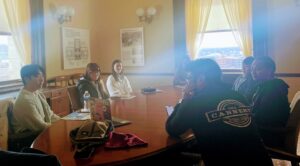
The Minnesota Legislature passed the ethnic studies bill in 2023 requiring all schools to have ethnic studies. This is a way for students and teachers to learn about other cultures and for students of color to feel more included in history and school. Supporters of the bill hope students learn the ability to see and understand another person’s perspective, culture, heritage and history.
All schools in Minnesota are required to have some type of ethnic studies by 2026. In some schools students are required to take ethnic studies, while in others it’s an elective class. Youth 4 Ethnic Studies leaders who are passionate about adding ethnic studies requirements and have spent time working at the Capitol.
This interview has been edited for length and clarity.
What does it mean or look like to have ethnic studies in schools?
Yao Buchl junior at Highland Park Senior High School: So ethnic studies, as always, it’s a class…but within ethnic studies, the first thing we talked about, we showed some videos about respect, and we actually learned a little bit about how you should start approaching things. I think there (were) a couple of other instances and stores like that we specifically initially studied.
I think those little stories have really shown how every person really matters. It’s not just the big names that you hear mainstream. Everything can be studied, everything can be valuable and learn from and that [is] what ethnic studies really looked like in a class setting.
Ethan Vue senior PSEO student at Spring Lake Park High School: My high school doesn’t offer an ethnic studies courses… It’s just kind of discouraging that as a high school student, the only ethnic studies related course, I can take it through PSEO.
Right now, I’m learning about immigration policy in the U.S, and just learning about that is very eye opening and just kind of learning about like the powers that play in the US and makes you think like what can you do?
Jacqueline Le senior at Great River School: I was very lucky to have in my sophomore year to be able to kind of experience and study ethnic studies. … The whole idea was that we would go out into our communities, and we would gather information and create a proposal for program. We implement that in our schools, (and) in our communities, to kind of bring ethnic studies beyond just the school level and beyond the community level.
Me and all other students at my school have been really trying to fight for ethnic studies to come back. But of course, again, it’s just kind of muddled by all this dialogue whether or not there are teachers that are qualified enough to teach it and who’s allowed to teach it and so on and so forth.
Ayida worked with Star Tribune reporter Eder Campuzano to finish her story. This story was completed at ThreeSixty’s Winter News Team: Capitol Edition in February 2024, where high school journalists covered important legislative issues, impacting Minnesota youth. Read more stories here.
